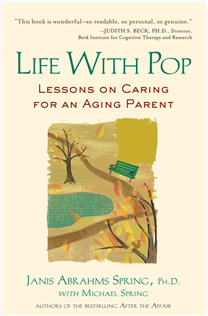An excerpt from the book, Life With Pop: Lessons On Caring For An Aging Parent, by Janis Abrahms Spring, Ph.D., with Michael Spring.
October 16, 2005
We grow up when we lose our parents. In facing their mortality, we face our own. Suddenly, we’re orphans with no one to shield us from the finiteness of our lives. There’s no hiding from it – our turn is next.
When I think of my inexorable decline, first losing a life partner, then losing life itself, I cringe. Fortunately, having cared for Dad, I feel more prepared for what lies ahead, as though I’ve taken a course in being a good Old Person. Thanks to him, I have a better sense of what it takes to morph gracefully into elderdom.
What exactly have I learned? Here’s a list of reminders that may help me survive old age and be the kind of model octogenarian my friends and family will want to have around. I plan to file it away in a drawer. If I’m lucky, I’ll live long enough to need it, and remember where it is.
- Be sure to show appreciation when your kids extend themselves to you. They have so much competing for their time. Don’t take those Eskimo Pies in the freezer for granted; they didn’t just magically appear.
- Make your health-care wishes known to your kids with the utmost specificity. Don’t saddle them with this responsibility, or you may find yourself dining on kosher fluid piped into your belly, against your will. Your input will free them from having to make these onerous and morbid decisions on their own.
- Don’t be ashamed to use a cane or walker. It’s dumb to let vanity trip you up. It’s selfish, too, because your children will need to manage your recovery.
- Don’t criticize yourself for wanting to steal bananas from the dining room, or for worrying about the cost of fruit salad. It’s an age-appropriate preoccupation.
- Assign power of attorney to those you trust, and let them know how you’d like your money invested and your assets distributed. It’s sticky business when these decisions are in their hands without directives from you.
- Don’t be too proud to pee in a diaper. It beats sitting in soggy pants and allows you to travel in wider circles.
- Tell your friends and family how much you love them, and how proud you are of them. You may not be able to find the words tomorrow.
- Redress old injuries. Invite your kids and close friends to air their grievances and tell you how you’ve hurt them over the years. Listen with an open heart. If you’ve wronged them, have the courage to apologize. Then, work to forgive yourself.
- Inhale the moments, often, every day. Don’t wait until your eyesight or hearing is compromised to realize your blessings. Use your senses to imbibe the wonder of the world.
- Don’t let others make you feel you’re more trouble than you’re worth. Your life is precious, no matter how impaired, if it’s precious to you.
- Don’t be cranky and demanding. You’ll lose your audience.
- Remember your kids’ birthdays. Write them in your calendar or ask your aide to remind you. You’re not the only one who likes to be celebrated.
- Sign up for activities. Try new ones. They will make your life more interesting and make you more interesting.
- Call friends. No one wants to be your social director, always reaching out to you.
- If your partner predeceases you, you might try dating. Dying of loneliness won’t bring that person back. Forming new attachments won’t diminish your love for him, or her.
- Eat tuna fish sandwiches in a garden. Watch the bees. Smell the roses. Find pleasure in the small stuff.
- Don’t be angry at your kids for putting you in a home. They may feel closer to you if they have their own space. Conversely, don’t rush to accept an invitation to live with them; they may be extending themselves for the wrong reasons.
- Your mind will play tricks on you. Be prepared. If you think your caregivers are treating you poorly and ripping you off, don’t be afraid to speak up to someone who can look into the matter and protect you. But be careful not to bite the hand that feeds you. If you don’t have facts, report your fears without harsh accusations.
- Be prepared to resent the invasion of privacy, the infantilization, that comes with having an aide. Try to negotiate some boundaries (or ask your kids to intervene) to balance your need for safety and assistance against your need for an autonomous life.
- Don’t be bashful about wearing a hearing aid. It beats sitting in silence — unless it doesn’t.
- Don’t let your bones calcify in bed or in a chair. Walk the hallways or the pool, move your legs, flap your arms. Use your lungs. Get outdoors even for a few minutes every day.
- Take care of your appearance. Don’t let yourself smell or rot. Ask people you trust to tell you what needs attending to.
- Don’t abuse drugs to control your pain, help you sleep, or medicate your depression. They’ll only make you more miserable and unstable.
- Be patient with your caregivers. It’s a hellish job.
- Try to accept your decline with humor. At ninety-two, Robert Maxwell mused, “As I look over my life, I have many regrets. Fortunately, I don’t remember what they are.”
- Stay sharp: read the paper, do puzzles, play bridge.
- There will come a time when you’ll need to give up your driver’s license and car. Better to do this too soon than too late.
- Your memory and strength will fade. Don’t let that happen to your enthusiasm for life. Find something amazing about each day.
- When bad things happen and there’s nothing you can do to change them, try to adopt an attitude of acceptance. Rome, shmome.
- Be careful not to pit one child against another. Let them know that you never want them to fight over you, that nothing matters more than for them to remain a supportive and loving presence in each other’s lives.
- Ask your kids to tell you the truth about your health. You may want to opt for comfort and maintenance, not cure.
- Be diligent about taking your medications. Don’t skip doses or make changes without consulting your caregiver.
- Convey your wishes regarding your funeral arrangements. Do you want to die in a hospital or at home? What clothes do you want to be buried in? What do you want your obituary to say? Where do you want charitable contributions sent? It’s your last party. The more information you convey, the more likely it will go your way.
- Ask your family to level with you when you’re dying. If possible, tell them when you’re ready to go.
JANIS ABRAHMS SPRING, PH.D is an award-winning author and board-certified clinical psychologist in private practice for 36 years. Dr. Spring is a recipient of the Connecticut Psychological Association’s Award for Distinguished Contribution to the Practice of Psychology, a former clinical supervisor in the Department of Psychology at Yale University, and a media guest on programs such as NPR and Good Morning America. She and her husband live in Westport, CT. For more information go to: www.janisaspring.com. Copyright 2009.
Photo by Tracy Finn.








Excellent advice! ILL TRY TO have my wishes done by xmas!!
Excellent list..
I have always loved reading your Blogs. This one really has hit home and I wonder how I can copy it for myself. “In Care of Dad ” Has always been Inspirational to me and I have learned a lot from it. I now live with someone that has Early Onset of Alz. No matter how much you know about Alz …when it hits home…it makes it tougher.
God Bless You All. Much Love from Helen